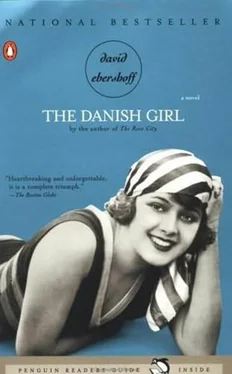Greta followed. Lili apparently wasn’t in a hurry, moving out of the way of other people in the street, stopping to look in the window of a store that sold mops and other cleaning supplies. In the window was a pyramid display of black-and-white Zebralin cans, and a photograph of a woman scouring her stovetop. Lili turned and looked at her watch again; and then her ankles, which from a distance looked no thicker than a child’s, began to step quickly away from Greta. Down Snaregade with its half-timber building and a burned-out streetlamp and toward Gammel Strand. Soon she was walking along Slotsholms Canal, its curved railing tied with the lines of one-man dories. There was a white life preserver looped to the rail, and an abandoned sturgeon hanging heavily on a hook. Light from the Børsen on the other side of the canal fell onto the water, and the Børsen’s twisted-copper spire was bright in the night. Lili continued to walk, looking at the fishing boats secured on the other side of the canal, their black masts creaking.
Lili stopped, unclasped her purse. It was too dark for Greta to see Lili’s eyes as she rifled through it, pulling out a handkerchief and a coin case and then the little enamel box that held her pills. Lili clicked it open. She put one on her tongue, and Greta thought she could make out Lili cringing as she swallowed the chalky tablet.
Greta thought about calling out to Lili, but then stopped herself. She watched Lili walk farther into the night toward the Knippelsbro. It was April, and the winds were blowing in from the Baltic. As Lili reached the second bridge, the wind fluttered the tail of her scarf. She stopped to fix the knot at her throat. She stopped to look for traffic, but there was none. The Inderhavn was choppy. Greta could hear the icy water sloshing against the bridge’s double bascule. She heard the Swedish ferry setting out to make its last crossing of the evening.
Greta didn’t know exactly where Lili was headed in Christianshavn, but she could imagine: an assignation probably, a rendezvous. Into her head popped a piece of an old song: There once was an old man who lived on a bog. She held the cold metal rail of Slotsholms Canal. The rail was bubbling with rust, and it smelled of salt, and Greta wrapped both hands around it as she watched Lili slip across the bridge, across the Inderhavn, the tail of her scarf fluttering like a child’s hand, waving goodbye.

By late spring the shiny green buds of the willow trees in Ørstedsparken had split open, and the rose beds around Rosenborg Slot were reddening with early leaf. The sky’s long winter canopy had lifted, and the evening began to stretch itself toward midsummer.
Lili, who had gained even more strength, accepted-the way a child accepts a mother’s kiss-Henrik’s offer of marriage. He proposed the night before sailing to New York on the Albert Herring . He had packed his trunks, with their chipped-leather handles, and crated up his paints and brushes. “To New York!” Henrik kept saying. “To New York!” Lili, who had told the other salesgirls at Fonnesbech’s about Henrik’s imminent departure, lifted her head and said, “Without me?”
They were in Henrik’s studio in Christianshavn, the scent of the canal coming through the window. The studio was empty except for the trunks and the crate marked with red letters: HENRIK SANDAHL, NEW YORK. The furniture’s removal had shoved snarls of dust and feathers into the corners, the little puffs undulating with the breeze from the window. Henrik, his hair recently sheared down to a fine cap of curls, said, “Of course not.” And then, “I’ve asked you before, and I’ll ask you again. Marry me?”
Lili had always wanted this. She knew one day she would marry; sometimes, when she thought about it, she felt she could play no greater role in this world than as a man’s wife, Henrik’s wife. Silly thought, even Lili knew, something she would never repeat to Greta, who didn’t think like that at all. But that was how Lili felt. She imagined shopping the second floor of Fonnesbech’s, where the men’s clothing hung on racks, and fingering the material of French-cuff shirts until she found the right one for Henrik. She imagined a net shopping sack bulging with groceries-the slab of salmon, the stone potatoes, the bouquet of parsley-that would become their dinner. She imagined the dark that would fall across their bed, and the way the mattress would dent as Henrik moved toward her.
“I want you to know one thing about me,” Lili said. She thought about the evening in Ørstedsparken years ago, when she left him crying her name. “Before we marry.”
“Tell me anything.”
“My name wasn’t Lili Elbe when I was born.”
“I know that already,” he said. “I already told you that I know. I know who you are.”
“No,” Lili said. “You know who I was.” She told him about Professor Bolk, about the stucco clinic along the Elbe, about Frau Krebs nursing her back to health. She’d never told anyone. Lili’s small circle-Greta, Hans, Carlisle, Anna-already knew about her, but she had never handed over the details of her nearly impossible transformation to anyone else. She had never asked anyone to enter that intimate circle, which sometimes felt too cramped to welcome another soul.
“I thought something like this had happened,” Henrik said. Lili could detect no horror in his face. Even now, it was what she sometimes expected: upon hearing the news, the world would turn away in disgust. “I’m not surprised.”
She asked him what he thought of her; do you think I’m a freak of some sort, she asked. For Lili’s notion of herself could flip-flop nearly by the minute: sometimes she looked in the mirror and exhaled and felt the settling peace of gratitude; other times she saw a man-woman, its head peering out of the collar of a dress. Greta and Hans told her not to think like that. But when she was alone, the self-doubt could creep back into her chest.
Henrik told her he didn’t know what else he could say except that he was in love with her. “I’m in love with an extraordinary woman,” he said. Lili used to think she couldn’t return the love of a man who saw her for who she was. She once told herself that she would push away anyone who recognized her as anything less than female. It was why she had first turned her back on Henrik, that evening in the park. Now, she took his hand.
“You can still love me like this?” she said.
“Oh, Lili,” he said, rocking her shoulder. And then, “When will you ever understand?”
“That’s why I can’t go to New York with you right away,” she said. “I need to return to Dresden. One last time.” She told him that Professor Bolk wanted her to return. He wanted to attempt a final metamorphosis. She didn’t want to explain the details to Henrik. He would worry, she thought. He might try to talk her out of it. He might believe it wasn’t possible.
Last year, before she’d left Dresden, Professor Bolk had promised he could do something else for Lili, something that would make her even more of a woman than she already was. Something that Greta said was “crazy even to think about.” Something so magnificent it was like an all-white dream, but was, Professor Bolk promised in his basso voice, more than possible. As she was preparing to leave the clinic, Bolk had told Lili that the ovarian transplants had succeeded. He eventually wanted to try a uterine transplant to make her fruitful. “You mean I could become a mother?” Lili had asked. “Haven’t I done everything I’ve ever promised? And I can do this too,” Bolk had said. But Greta dissuaded her. “Why would you want to do that?” Greta had said, swatting her hands. “And besides, that’s utterly impossible. How on earth could he ever do that?”
Читать дальше













